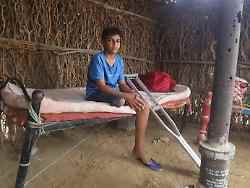Last minute extension
Yemen gets two more months of ceasefire
8/3/2022 4:48 am
A devastating civil war, which is actually a proxy war between Saudi Arabia and Iran, has been raging in Yemen for over seven years. A ceasefire gives the suffering population a moment to breathe a sigh of relief. Can the new extension further ease the conflict?
At the last minute, the parties to the conflict in Yemen agreed to extend the ceasefire by a further two months. The UN Special Envoy for Yemen, Hans Grundberg, announced that this would continue under the conditions already in force until October 2 – shortly after the end of the current ceasefire in the country. Both sides have also assured that they want to work together towards an even more far-reaching agreement, Grundberg said.
A civil war has been raging in Yemen for more than seven years, plunging the poor country on the Arabian Peninsula into a humanitarian catastrophe. More than 150,000 people were killed, including 14,000 civilians. Saudi Arabia has been fighting there with allies since 2015 against the Houthi rebels, who control large parts of the north. Riyadh sees them as an extension of its nemesis Iran. The UN and aid organizations are trying to provide for around 23 million people in the country, including 11 million children. About 19 million people do not have enough to eat.
Land mines continue to explode
The ceasefire came into effect for two months at the beginning of April and was then extended in June. There had been no ceasefire in the country since 2016. Since then, the number of civilians killed has declined, as have the otherwise regular attacks by the Houthis across the border to Saudi Arabia with rockets and drones. However, civilians continued to die from landmines, for example. The ACLED analysis project has counted 300 fatalities and 1,700 violations of the ceasefire since it began. The agreement gave the suffering population a moment of “rest and hope,” said 30 aid organizations, including CARE, Oxfam and the International Rescue Committee. This progress should not be wasted. The parties to the conflict must “allow people to restore and rebuild their lives”.
As part of the deal, more ships than usual docked at the port of Hodeidah, bringing much-needed fuel into the country. This enables hospitals and companies, for example, to work better and longer. A resumption of commercial flights has also allowed more than 8,000 people to fly out of the capital Sana’a to Cairo and Amman for medical treatment or personal and business purposes.
According to Grundberg, the new negotiations will continue to deal with these issues as well as the long-controversial payment of salaries to civilian state employees in Houthi-controlled areas. So far, they have also refused to agree to a hoped-for opening of important roads around Tais in the south-west.
The US and the EU are calling for additional steps
US President Joe Biden and US Secretary of State Antony Blinken welcomed the ceasefire extension. Biden said it was an important step to save lives. But in the long run it’s not enough. Blinken emphasized that the US remains committed to a lasting, all-inclusive peace agreement in Yemen. The EU also welcomed the extension of the ceasefire and called on all parties to continue working vigorously towards full implementation. Additional steps would need to be taken to realize the ceasefire’s potential, said a spokesman for foreign policy chief Josep Borrell. The United Nations Children’s Fund Unicef also welcomed the extension of the ceasefire. Since its beginning, the number of victims has decreased significantly. However, more needs to be done to protect children in Yemen.
All efforts to find a lasting solution to the conflict have so far failed. US President Joe Biden’s visit to Saudi Arabia in July also made no progress. The Houthi leadership had sharply criticized Biden’s visit. The rebels held a military parade Monday, displaying missiles, anti-tank weapons and drones. The war will intensify, said army commander Mahdi al-Maschat, according to the rebel-affiliated TV channel Al-Masirah. It will be a “year of victory”.
